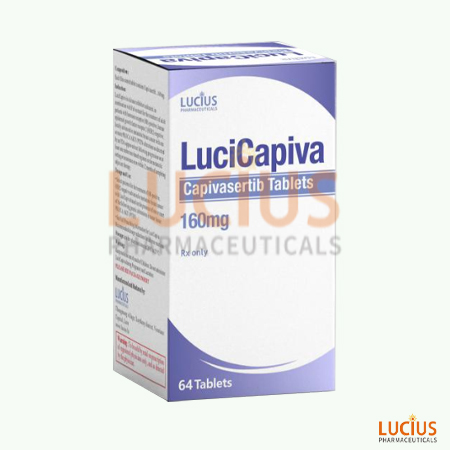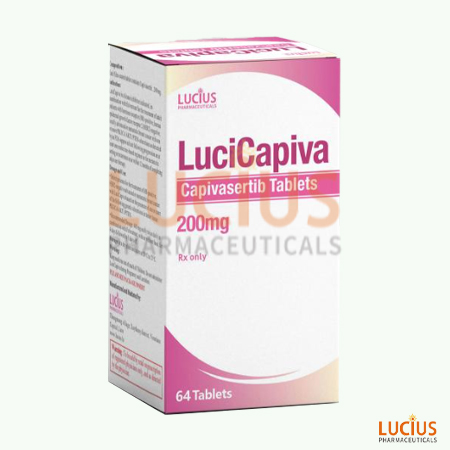



Another NameTruqap、卡帕塞替尼
IndicationsCapivasertib is suitable for the treatment of adult patients with specific types of breast cancer.
Reg No.08 L 1167/24
Inspection NO.1543-24
Capivasertib, developed by AstraZeneca, is a potent selective inhibitor targeting the AKT pathway.
The Capivasertib produced by Lucius has two specifications, 160mg and 200mg, for patients to choose from.
The mechanism of action of Capivasertib is to inhibit the activity of AKT, block this signaling pathway, ultimately suppress cancer cell proliferation, and even induce cancer cell death.
Capivasertib
Capivasertib is suitable for the treatment of adult patients with specific types of breast cancer.
There are no available data on the use of Capivasertib in pregnant women. Advise pregnant women and females of reproductive potential of the potential risk to a fetus.
There are no data on the presence of capivasertib or its metabolites in human milk or their effects on milk production or the breastfed child. Because of the potential for serious adverse reactions in a breastfed child, advise women not to breastfeed during treatment with Capivasertib.
Females
Advise females of reproductive potential to use effective contraception during treatment with Capivasertib and for 1 month after the last dose.
Males
Advise male patients with female partners of reproductive potential to use effective contraception during treatment with Capivasertib and for 4 months after the last dose.
The safety and effectiveness of Capivasertib have not been established in pediatric patients.
No overall differences in the efficacy of Capivasertib were observed between patients ≥ 65 years of age and younger patients.
No dosage modification is recommended for patients with mild to moderate (creatinine clearance (CLcr) 30 to 89 mL/min) renal impairment.
Capivasertib has not been studied in patients with severe (CLcr 15 to 29 mL/min) renal impairment.
No dosage modification is recommended for patients with mild hepatic impairment (bilirubin ≤ upper limit of normal (ULN) and AST > ULN or bilirubin > 1 to 1.5x ULN and any AST).
Monitor patients with moderate (bilirubin > 1.5 to 3x ULN and any AST) hepatic impairment for adverse reactions due to potential increased capivasertib exposure.
Capivasertib has not been studied in patients with severe (bilirubin > 3x ULN and any AST) hepatic impairment.
Drug overdose is not yet clear.
Store Capivasertib in original packaging to maintain stability at 20°C to 25°C (68°F to 77°F). Excursions permitted to 15°C to 30°C (59°F to 86°F).
Tmax is approximately 1-2 hours. The absolute bioavailability is 29%.
from FDA,2024.09